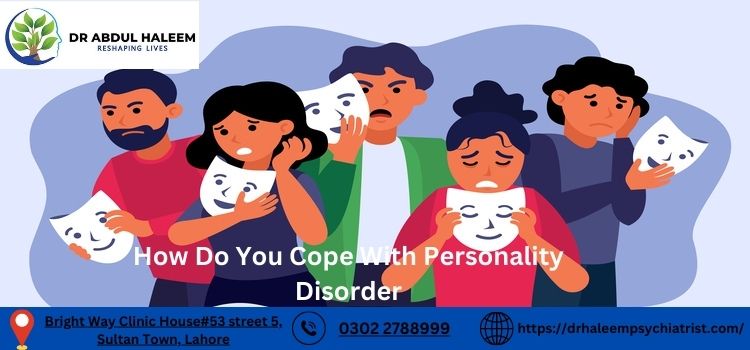The question arises How do you cope with a personality disorder? Living with a personality disorder can be difficult to cope with mentally and emotionally. From facing the stigma surrounding mental health issues to struggling to manage its effects on relationships, life can become overwhelming very quickly.
In this blog post, we’ll discuss various coping methods for dealing with a personality disorder—from establishing better habits in order to strive towards self-awareness and positive change to finding helpful resources for support networks.
Let’s drive in to get more details.
How do you cope with a personality disorder?

One of the most effective coping strategies for managing a personality disorder is developing self-awareness. The more you can learn about your condition and recognize how it affects your thoughts, feelings, and behavior, the better equipped you’ll be to develop healthy habits in order to cope with any challenges that come your way.
Start by doing research on your specific diagnosis and familiarize yourself with the symptoms of your disorder. This can help you identify which triggers are most likely to cause distress and manage them more effectively. Additionally, talking therapy can be beneficial as it gives you the opportunity to discuss how your disorder plays out in your life and learn strategies for improving it.
Understanding your disorder and its symptoms
- Acknowledge your diagnosis
- Keep an open dialogue with healthcare professionals
- Learn what triggers your symptoms and how to reduce their impact
- Take note of any changes in your condition or response to treatment
It is important to become more aware and acquainted with the specificities of living with a personality disorder. Understanding its features, risks, and symptoms can help you identify potential triggers and develop strategies for preventing or managing the associated discomfort.
By researching your disorder, keeping an open dialogue with healthcare professionals, and taking note of any changes in your condition—you’ll be able to better understand its effects on your life. With this knowledge, you’ll be more prepared to face whatever may come with living with a personality disorder.
Establishing better habits and striving for self-awareness
- Maintain a balanced lifestyle
- Exercise regularly for physical and mental well-being
- Incorporate healthy eating habits into your daily routine
- Find ways to relax, such as yoga or meditation
While it may seem intimidating at first, establishing better habits and striving for self-awareness can help you maintain a balanced lifestyle. Exercise regularly for physical and mental well-being, and incorporate healthy eating habits into your daily routine. It’s also important to find ways to relax—such as taking up yoga or meditation—in order to gain some much-needed clarity.
Finding a support network and learning to accept help
- Reach out to friends and family
- Seek therapy or counseling
- Join a support group for individuals with similar experiences
Don’t forget that you don’t have to go through this alone. Reaching out to your close friends and family is an important step in building your own personal support network. Additionally, seeking therapy or counseling and joining a support group are great ways to gain insight into your condition. These resources can also offer a safe environment to help learn to accept help and talk about your feelings.
Maintaining positive relationships
- Prioritize healthy communication
- Stay kind and honest with yourself and those around you
- Work on building trust with others
- Savor the small moments and conversations ow understanding and compassion in any interactions
Maintaining positive relationships can be especially difficult when living with a personality disorder. It’s important to prioritize healthy communication in order to stay kind and honest with yourself and those around you. Additionally, working on building trust with others by taking time to savor the small moments and conversations is key to cultivating strong relationships.
Practicing self-care and mindfulness to reduce stress
- Create a daily routine
- Set aside time for yourself every day
- Do activities you enjoy or find relaxing
- Show yourself understanding and compassion in any interactions
To reduce stress levels, it’s important to practice self-care and mindfulness. Creating a daily routine can be beneficial as it helps give meaning to your days, while setting aside time for yourself every day is necessary to reflect and unwind. Do activities you enjoy or find relaxing, and show yourself understanding and compassion in any interactions.
By following these steps, you’ll be able to effectively manage your condition and improve the quality of your life. With the right resources, support network, and coping methods—you can learn how to work through the difficult times and come out with a newfound sense of strength.
Seeking therapy from an experienced professional
- Find a therapist that specializes in personality disorders
- Be patient while you adjust to the therapy
- Keep notes of your conversations and progress
Additionally, seeking therapy from an experienced professional can help to gain a better understanding of the condition as well as its effects on daily life. It’s important to find a therapist that specializes in personality disorders
Exploring options for medication, if necessary
- Consider all the potential benefits and risks
- Rely on advice from healthcare professionals
- Ask questions before starting a new medication
If necessary, exploring options for medication can be an effective way to manage symptoms. However, it’s important to consider all the potential benefits and risks associated with each one. You should always rely on advice from healthcare professionals, and be sure to ask questions before starting a new medication.
Living with a personality disorder can be difficult, but it doesn’t have to be overwhelming. By utilizing these coping methods, you can begin to manage your condition and start improving the quality of your life. Keep in mind that recovery is a journey—so take it one day at a time. With patience, perseverance, and understanding—you can find the strength to get through it.
Coping with Stigma
- Acknowledge the stigma associated with mental health
- Reach out to supportive friends and family for help
- Take part in activities that challenge negative stereotypes
- Speak out against discrimination and prejudice whenever possible
Unfortunately, living with a personality disorder can come with the burden of dealing with stigma. It’s important to acknowledge the prejudice and discrimination surrounding mental health, and reach out to supportive friends and family for help in navigating difficult conversations. One way you can combat this issue is by taking part in activities that challenge negative stereotypes—such as attending public events or joining a support group. Additionally, speaking out against discrimination and prejudice whenever possible is an effective way to raise awareness and help fight stigma.
No matter how challenging life may seem, it’s important to remember that you are strong enough to get through this. With the right resources, coping methods, and support network—you can learn to manage your condition and create a life you can be proud of.
Finding Ways to Express Yourself
- Make time for creative endeavors
- Reach out to those who understand your experiences
- Use art, music, and writing as an outlet for emotions
- Find ways to embrace rather than suppress your feelings
It’s important to find ways to express yourself while living with a personality disorder. Making time for creative endeavors such as art, music, or writing can be an effective outlet to explore and manage your emotions. Additionally, connecting with those who understand your experiences provides an opportunity to open up without feeling judged or misunderstood. And finally, finding ways to embrace rather than suppress your feelings—through yoga or meditation—can have a calming effect and help foster self-love.
Living with a personality disorder doesn’t have to be an uphill battle. With the right strategies, support network, and coping methods—you can effectively manage your condition and improve the quality of your life. Remember to always take it one day at a time and be kind to yourself—you are strong enough to get through this.
Joining a Support Group
- Participate in online forums for support
- Connect with others who face similar struggles
- Share stories and advice in a safe, judgment-free environment
Joining a support group can also be beneficial for managing life with a personality disorder. There are various online forums where you can find understanding and support from those who face similar struggles. Being able to connect with others who understand what you’re going through can be empowering, as it provides an opportunity to share stories and advice in a safe, judgment-free environment.
Living with a personality disorder doesn’t have to be overwhelming—it can also be an opportunity for growth and self-exploration. With the right coping strategies, support network, and understanding—you can work through the difficult times and come out with a newfound sense of strength. Remember to always take it one day at a time and be kind to yourself—you are strong enough to get through this.
Understanding Your Emotions
- Take part in activities that promote self-reflection
- Read books or articles about managing emotions
- Practice mindfulness and relaxation techniques
Understanding your emotions is key to managing life with a personality disorder. Taking part in activities such as yoga, meditation, or journaling can help to gain a better understanding of the condition and its effects on daily life. Additionally, reading books and articles about managing emotions can also help to identify triggers and develop strategies for coping. Lastly, practicing mindfulness and relaxation techniques can provide a calming effect and help foster self-love.
Living with a personality disorder doesn’t have to be overwhelming—it can also be an opportunity for growth and self-exploration. With the right coping strategies, support network, and understanding—you can work through the difficult times and come out with a newfound sense of strength. Remember to always take it one day at a time and be kind to yourself—you are strong enough to get through this.
Conclusion
The question arises How do you cope with a personality disorder?Living with a personality disorder can be difficult, but it doesn’t have to be overwhelming. By utilizing the right coping strategies, support network, and understanding—you can learn to manage your condition and improve the quality of your life.
FAQS
Frequently asked questions by people.
What are the four main personality disorders?
The four main personality disorders are Borderline Personality Disorder, Antisocial Personality Disorder, Narcissistic Personality Disorder, and Obsessive-Compulsive Personality Disorder.
What causes personality disorder?
Personality disorder is thought to be caused by a combination of genetic and environmental factors. There may also be biological factors that play a role in the development of personality disorders, such as problems with brain functioning or hormone imbalances.
What causes personality disorder?
Personality disorder is thought to be caused by a combination of genetic and environmental factors. There may also be biological factors that play a role in the development of personality disorders, such as problems with brain functioning or hormone imbalances.


